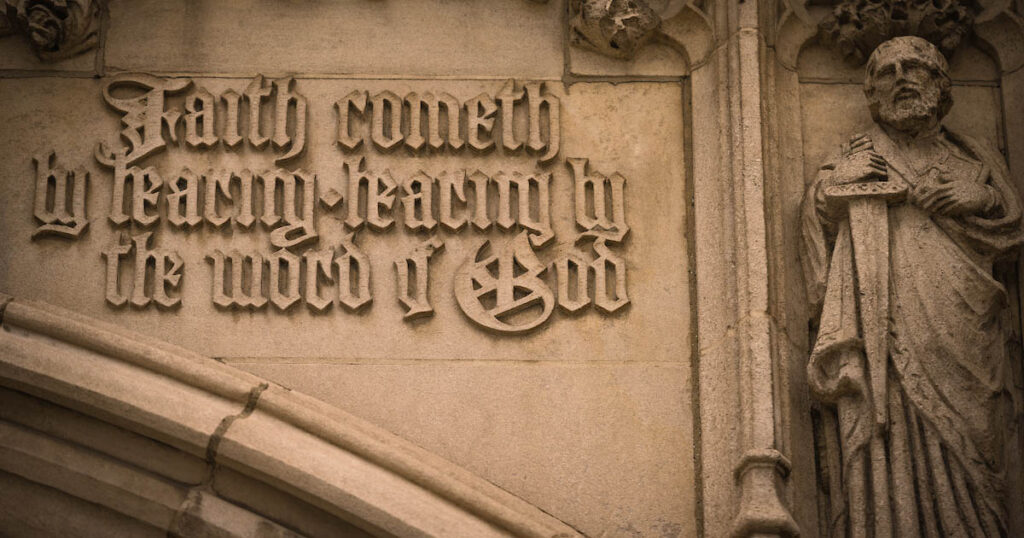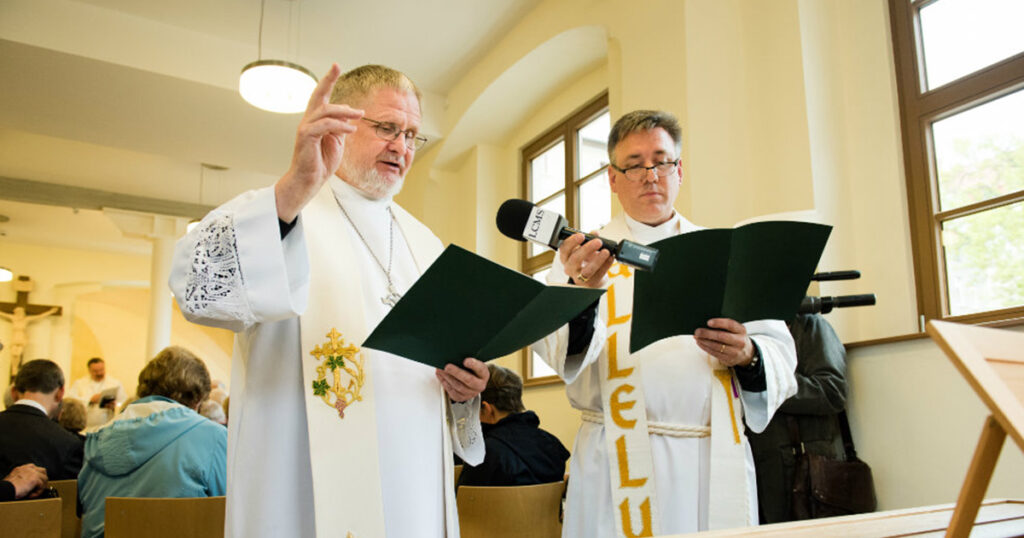Part 2 of a discussion on Martin Luther’s The Freedom of a Christian. Read part 1 here.
In this next section of The Freedom of a Christian, Luther unpacks his assertion that faith alone justifies the sinner before God. Luther does not see faith as an inherent power of capacity; that makes faith into a human work. Rather, faith is the trust in Christ Jesus that God Himself works through His Word. This faith in Christ, exclusive of any and all works, saves:
Because this faith can only rule the inner person, as Rom. 10[:10] says (‘one believes with the heart and so is justified’), and because this faith alone justifies, it is clear that the inner person cannot be justified, freed, or saved by any external work or activity at all and that no works whatever have anything to do with the inner person. (493)[*]
Here, Luther follows the apostle Paul in excluding everything but faith in Christ from our justification before God. Good works, even the deeds commanded by God’s Law, much less the human traditions imposed by the pope, do not provide reconciliation with God and liberation from divine condemnation. Only Christ apprehended exclusively by faith supplies righteousness in God’s eyes.
Luther cannot cease extolling this faith. It is, he says, “an incomparable treasure,” for it brings salvation without any need to be supplemented by works of human righteousness. In contrast to the Roman Catholic teaching that faith must be formed by works of love to be efficacious, Luther relies on the divine promise that the one who believes in Christ is justified.
Commands and promises
At this point, Luther anticipated the question that might well arise from those who read his tract both in his time and in ours. How can a person be justified by faith alone when the Bible prescribes numerous rules and regulations in both the Old and the New Testaments? Before Luther continues his discussion of faith, he instructs his readers in making a necessary distinction between God’s Law and His Gospel, or His commands and His promises: “In the meantime it should be pointed out that the entire Scripture of God is divided into two parts: commands and promises” (494).
Commands teach us what we are to do and not do, but they lack the power to accomplish these good and God-pleasing realities in our lives. Through them, Luther says, we see our inability to be righteous. In this way, the commands of God lead to despair. And if the Law is not satisfied, we remain under God’s wrath and condemnation.
Then Luther makes an amazing turn. The Law is not fulfilled by our good works, which always miss the mark of perfection. The Law is fulfilled through faith alone. “If you want to fulfill the law, ‘You shall not covet,’ as the law demands, then look here! Believe in Christ, in whom grace, righteousness, peace, freedom, and all things are promised to you. If you believe, you will have these things; if you do not believe, you will lack them” (495). The person who has faith in Christ lacks nothing. What the Law demands but cannot accomplish, Christ gives. “God alone commands, and God alone fulfills” (496).
Three benefits
Faith, Luther says, has three benefits. First, through faith we are “swallowed up” by God’s promises and are made His beloved children so that “this Christian freedom referred to above, namely our faith … does not cause us to be lazy and lead evil lives but instead makes the law and works unnecessary for the righteousness and salvation of the Christian” (497).
Second, faith honors God by attributing to Him truthfulness and righteousness. Faith does not hold God in contempt but lets Him be the Lord that He is. Faith is the highest worship of God and only through faith are we obedient to God.
Third, faith unites the soul with Christ just as a bride is made one flesh with her bridegroom. Through faith, whatever belongs to Christ (righteousness) becomes the property of the believer even as in this blessed exchange the sin of the believer belongs to Christ:
Now let faith intervene and it will turn out that sins, death, and hell are Christ’s, but grace, life, and salvation are the soul’s. For if he is the groom, then he should simultaneously both accept the things belonging to the bride and impart to the bride those things that are his. For the one who gives his body and his very self to her, how does he not give his all? And the one who receives the body of the bride, how does he not take all that is hers? (500)
Delightful drama
Luther describes this marriage as “the most delightful drama” (500). He calls faith the wedding ring that joins the believer to Christ Jesus so that what is Christ’s is now the believer’s and what is the believer’s is now Christ’s. The believer’s sin is Christ’s as if He Himself had sinned. Christ’s righteous life, His innocent death and His victorious resurrection are the believer’s as if he had done these things himself. Even though in our sin we are the “poor, disloyal little prostitute” (501), our sins cannot destroy us because Christ owns them.
By faith we receive all that belongs to Christ. In Him, we are the firstborn of God and heirs of all of the divine promises. In Christ we are priests and kings (1 Peter 2:9). As priests, we have access to God through our great High Priest, Jesus, and offer the sacrifices of prayer and thanksgiving.
As kings, we rule not as worldly political leaders in the secular realm, as secular heads of government. Instead, Luther says, “the more Christian a person is, the more he or she is subject to evils, suffering, and death, as we see in Christ, the firstborn himself, and in all his holy brothers [and sisters]” (505). Like Christ, we rule in the midst of our enemies (Psalm 110:2), for in Him, we have victory over the world, sin, death and the devil.
Hearing
Faith comes by hearing the Word of Christ, so Luther highlights the necessity of good preaching (Rom. 10:14–17). Luther begins by telling his readers what is not good preaching. Good preaching does not merely retell the historical narrative of Jesus’ life and deeds as though He were merely an example that we must emulate to be saved. Good preaching does not play on emotions to arouse sympathy for the suffering of Jesus or incite anger against the Jews. “Preaching, however, ought to serve this goal: that faith in Christ is promoted. Then he is not simply ‘Christ’ but ‘Christ for you and me,’ and what we say about him and call him affects us” (508).
Faith cannot live without the preaching of Christ. Listen again to Luther:
This faith is born and preserved by preaching why Christ came, what he brought and gave, and what are the needs and fruit that his reception entail. This kind of preaching occurs where Christian freedom, which we gain from him and which makes us Christians all kings and priests, is rightly taught. In him we are lords of all, and we trust that whatever we might do is pleasing and acceptable in God’s sight, as we said above. (508)
Preaching draws the Christian outside of self and into Christ, in whom we have real freedom.
In the third and final part of this series, we will examine what Luther has to say about the good works done in the freedom of faith.
[*] All citations are taken from The Freedom of a Christian translated by Timothy J. Wengert in The Annotated Luther, Vol. I: The Roots of Reform (Minneapolis: Fortress Press, 2015), 467–538.





The author says, “Preaching draws the Christian outside of self and into Christ, in whom we have real freedom.”
Where lies the power to change souls so? Jesus said, “No one can come to me unless the Father who sent me draws him.” (John 6:44 ESV)
And elsewhere we read, “So neither he who plants nor he who waters is anything, but only God who gives the growth.” (1 Cor. 3:7 ESV)